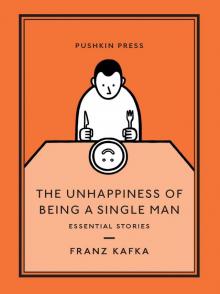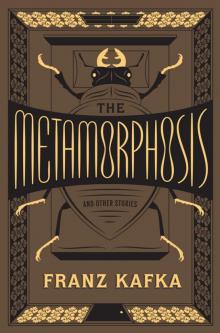- Home
- Franz Kafka
The Unhappiness of Being a Single Man Page 2
The Unhappiness of Being a Single Man Read online
Page 2
Georg was amazed by how dark his father’s room was even on such a sunny morning. He realized for the first time how big a shadow was cast by the high wall on the other side of their narrow courtyard. His father was sitting by the window in a corner that had been decorated with various mementoes of Georg’s late mother and reading a newspaper, which he was holding at an angle to try and compensate for some weakness in his eyes. On the table were the leftovers from his breakfast, which he seemed to have hardly touched.
“Ah, Georg!” said his father and went over to him at once. His heavy dressing gown swung open as he walked, its ends billowing around him. ‘My father is still a giant of a man,’ thought Georg.
“It’s so dark in here,” he said.
“Yes, it’s dark, right enough,” responded his father.
“And you’ve got the window shut as well?”
“I prefer it that way.”
“When it’s so nice and warm outside,” Georg said as if carrying on with his previous comment, and sat down.
His father tidied away the breakfast dishes and put them on top of a sideboard.
“I actually just wanted to tell you,” Georg went on, distractedly following the old man’s movements, “that I’ve sent the news of my engagement to St Petersburg.” He pulled the letter slightly out of his pocket and let it fall back in.
“Why to St Petersburg?” asked his father.
“My friend there, you remember,” said Georg and tried to catch his father’s eye. ‘He’s so different at work,’ he thought, ‘look how solid he is at home, sitting there with his arms crossed.’
“Yes. Your friend,” said his father with emphasis.
“You know, Father, that at first I didn’t want to tell him about my engagement. Just to be considerate, not for any other reason. You know yourself he’s a difficult person. I said to myself, he might well find out from somebody else that I’m engaged, although it’s hardly likely given how solitary he is—there’s nothing I can do about that—but he won’t hear it directly from me.”
“And now you’ve thought it over again?” his father asked, putting the big newspaper on the window sill, his glasses on the newspaper and his hand on top.
“Yes, now I’ve thought it over again. If he’s a good friend to me, I said to myself, then the happy news that I’ve got engaged should make him happy too. And that’s why I stopped hesitating and told him about it. But before I post the letter, I wanted to mention it to you.”
“Georg,” said his father with a toothless grimace, “listen to me. You’ve come to me with this thing to ask my advice about it. That speaks in your favour, no doubt about it. But it means nothing, less than nothing, if you don’t tell me the whole truth about it. I don’t want to stir things up that shouldn’t come into it. Some less than pleasant things have happened since the death of dear Mother. Perhaps the time will come for them, too, and perhaps it will come sooner than we expect. I’m missing things in the business, perhaps it’s not that things are being done behind my back—I’m not at all saying that they’re being done behind my back—I don’t have the strength any more, my memory’s going, I can’t keep my eye on all the moving parts like I used to. That’s partly nature taking its course, first of all, and secondly the death of darling Mother perhaps hit me harder than it did you. But since we’re talking about this now, about this letter, I ask you, Georg, don’t lie to me. This is such a trivial question, hardly worth speaking about, so don’t lie to me. Do you really have this friend in St Petersburg?”
Georg stood up in embarrassment. “Let’s leave my friends for now. A thousand friends wouldn’t be enough to replace my father. You know what I think? You’re not taking care of yourself enough. And age takes a toll. You’re indispensable to me at work, but if the business ever put your health at risk, I’d close it down tomorrow. That goes without saying. We’ve got to start you on a different way of life. From the ground up. You’re sitting here in the dark, and in the living room it’s nice and bright. You’re picking at your breakfast instead of keeping up your strength. You’re sitting here with the window shut when the fresh air would do you so much good. No, Father! I’m going to fetch the doctor and we’re going to do what he prescribes. We’re going to swap rooms: you can move into the front room, I’ll move in here. You won’t have to change anything, we’ll move all your things across with you. But there’s plenty of time for all that, just have a lie down for the time being, I’m sure you need some rest. Here, I’ll help you get undressed, you’ll see that I can do it. Or if you want to move into the front room right away, you can just get into my bed. That would be very sensible.”
Georg was standing close in front of his father, who had let his head with its messy white hair sink to his chest.
“Georg,” his father said quietly, without moving.
Georg immediately knelt in front of his father. In his tired face he saw overlarge pupils in half-shut eyes, looking at him.
“You don’t have a friend in St Petersburg. You’ve always been a practical joker and you haven’t held back even with me. How could you have a friend there, of all places? You can’t expect me to believe that.”
“Just think back, Father,” said Georg, helping his father out of his chair and taking his dressing gown off him while he stood there, really quite weak on his feet. “It was nearly three years ago, my friend was here visiting us. I remember that you didn’t like him very much. I ended up disowning him to you, it happened at least twice, even though he was sitting right there in my room. I thought that disliking him was completely understandable; after all, my friend can be quite odd. But then after that you finally had a very good chat with him. I remember being proud that you were listening to him, nodding your head and asking him questions. If you think back, you’ll be sure to remember. He was telling us these unbelievable stories about the Russian Revolution. About how once when he was on a business trip to Kiev he got caught up in some pandemonium and saw a priest on a balcony cut a bloody cross into the palm of his hand, hold it up and shout to the mob. I’ve even heard you tell that story yourself from time to time.”
Meanwhile Georg had managed to sit his father down again and carefully take off the pyjama trousers he wore over his linen underwear, as well as his socks. At the sight of the not particularly clean underwear, Georg began to reproach himself for neglecting his father. There was no doubt it was his responsibility to oversee the regular changing of his father’s underwear. How to arrange his father’s future was something he and his fiancée hadn’t yet explicitly discussed, because they’d tacitly assumed that his father would stay on alone in the old apartment. But now he quickly and firmly decided that he would take his father with him into his new household. On closer inspection, it almost seemed as if the care Georg would then arrange might already be too late.
He carried his father to bed. A horrible sensation came over him when he realized, as he took the few paces across the room, that his father was playing with the watch chain hanging from Georg’s chest. He held on to it so tightly that at first Georg couldn’t put him down.
But as soon as he was in bed everything seemed fine. He got under the covers himself and then pulled the blanket up past his shoulders. He looked up at Georg with a not unfriendly expression.
“Isn’t that right, you’re already starting to remember him?” asked Georg, nodding at him encouragingly.
“Am I properly covered up?” asked his father, as if he couldn’t check whether his feet were sticking out.
“So you’re very happy in bed,” said Georg, and rearranged the blanket into a better position.
“Am I properly covered up?” his father asked again, seeming to pay especially close attention to the answer.
“Just rest easy, you’re properly covered up.”
“No!” his father shouted almost before Georg had finished speaking, threw back the blanket with such force that it unfurled itself in mid-air, and stood upright on the bed. He lightly held on to the ceiling w
ith one hand. “You wanted to cover me up, I know that, sunshine, but I’m not buried yet. And even if this is the last of my strength, it’s enough for you, too much for you. Of course I know your friend. He would have been a son after my own heart. That’s why you’ve strung him along all these years. Why else? Do you really think I never wept for him? That’s why you lock yourself in your office, you’re not to be disturbed, the boss is busy—just so you can send your lying little letters to Russia. But luckily no one needs to teach a father how to see through his son. Now that you think you’ve done him down, done him so far down you can sit your arse on him and he won’t even move, my little lord of a son has decided he will marry!”
Georg gazed up at this terrible vision of his father. The fate of his friend in St Petersburg, whom his father suddenly knew so well, struck him as never before. He saw him lost in the Russian expanses. He saw him at the door of his empty, looted shop. Among the wreckage of the shelves, the shredded goods, the broken gas fittings, he was only just still standing. Why did he have to move so far away!
“But look at me!” cried his father, and Georg, almost losing his mind, ran over to the bed to grab on to something, but faltered halfway there.
“Because she lifted up her skirt,” his father began to warble, “because she lifted up her skirt like this, that horrible tramp.” And to demonstrate what he meant, he lifted his nightshirt so high that you could see the scar from his war years on his thigh. “Because she lifted up her skirt like this and this and this, you threw yourself at her, and so that you can gratify yourself without any interruptions, you’ve disgraced Mother’s memory, betrayed your friend and tried to stick your father in bed so he can’t move a muscle. But can he still move or can’t he?”
He stood totally unsupported and kicked his legs. He beamed with insight.
Georg stood in a corner, as far as possible from his father. A long time ago he’d resolved to observe everything that happened completely and precisely, so that he couldn’t be taken by surprise if something came at him from behind or dropped on him from above. Now he remembered that long-forgotten resolution and promptly forgot it again, just as you can unwittingly pull a short thread out of the eye of a needle.
“But your friend hasn’t been betrayed!” his father cried, waving a finger back and forth to reinforce what he was saying. “I’ve been his representative here on the ground.”
“Clown!” Georg couldn’t stop himself from shouting; he recognized the damage at once and, too late, his eyes fixed, bit into his tongue so hard he flinched in pain.
“Yes, I’ve been clowning! Clowning! Good word! What other consolation is there for a widowed old father? Well—and for the moment let’s say you’re still my living son—what else is left for me, in my back room, hounded by disloyal staff, old to the marrow? While my son merrily swans around, closing deals that I prepared, falling over himself with smugness, and parading about in front of his own father with the reserved expression of an honourable gentleman! Do you think I didn’t love you—I, the one you came from?”
‘Now he’ll bend forward,’ thought Georg, ‘if only he’d fall and shatter into pieces!’ This phrase whistled through his head.
His father bent forward, but didn’t fall. Since Georg didn’t come closer, as he’d expected he would, he lifted himself up again.
“Stay where you are, I don’t need you! You think you’ve still got the strength to come over to me and that you’re just holding yourself back because that’s what you choose to do. How wrong you are! I’m still the stronger of us by far. If I’d been on my own I might have had to give way, but Mother passed on her strength to me, I’ve made a lovely alliance with your friend, I’ve got your clients here in my pocket!”
‘Even in his shroud he’s got pockets!’ Georg said to himself, and thought that this observation would make it impossible for his father to exist. Only for an instant did he hold that thought, then as always he forgot it entirely.
“Just try coming to see me with your fiancée on your arm! I’ll swat her aside like you can hardly imagine!”
Georg frowned as if doubting that were true. His father just nodded towards Georg’s corner, asserting what he’d said.
“I found it so funny today when you came to ask whether you should write to your friend about your engagement! He already knows everything, you stupid boy, he knows everything! I’ve been writing to him, because you forgot to take my writing things away. That’s why he hasn’t come for years, he knows everything a hundred times better than you do yourself, he scrunches up your letters unread in his left hand while he holds up mine in his right!”
He swung his arm over his head in enthusiasm. “He knows everything a thousand times better!”
“Ten thousand times!” said Georg, to deride his father, but as he said the words, they came out sounding deadly earnest.
“For years I’ve been waiting for you to come to me with this question! Do you think I care about anything else? Do you think I read the paper? There!” And he tossed Georg a page from a newspaper that had somehow been carried with him into bed. An old paper with a name that Georg didn’t even recognize.
“How long you hesitated before you were finally ready! Your mother had to die, she didn’t live to see the happy day, your friend has been falling apart out there in Russia, even three years ago he was so sick it was all but over, and me, well, you can see what condition I’m in. You’ve still got eyes for that!”
“You ambushed me!” shouted Georg.
His father said pityingly: “You probably wanted to say that earlier. Now it doesn’t make sense any more.”
And louder: “So now you know what else there is besides you; before now you only knew about yourself! You were an innocent child, really, but as a man you’ve been a fiend! — So pay attention: I now sentence you to death by drowning!”
Georg felt chased out of the room, with the crash of his father falling onto the bed ringing in his ears. On the stairs, which he rushed down as if they were a smooth slope, he bowled into his cleaning woman, who was just going up to tidy the apartment for the morning. She shouted “Jesus!” and covered her face with her apron, but he was already gone. He burst out of the door and raced across the road towards the water. A moment later, he was gripping the railing like a starving man grips food. He swung himself over it like the excellent gymnast he’d been in his teenage years, to the pride of his parents. He clung on, his hands weakening, until between the railing’s posts he saw a bus approaching that would easily cover the noise of his fall, then cried out softly, “Dear parents, haven’t I always loved you?” and let himself drop.
Meanwhile an almost endless stream of traffic went over the bridge.
THE TRUTH ABOUT SANCHO PANZA
SANCHO PANZA—who incidentally has never boasted about this—used to leave out piles of novels about knights and robbers in the evenings and for the long hours of the night, and by doing so for several years he succeeded in distracting his devil, whom he later gave the name Don Quixote, so completely that this devil threw himself into all kinds of crazy exploits, which, because they lacked a definite target—it should have been Sancho Panza—never hurt anyone. Sancho Panza, a free man, calmly followed Don Quixote on his quests, perhaps out of a sense of responsibility, and got a great deal of edifying entertainment from him till the end of his days.
THE BRIDGE
I WAS S TIFF AND COLD, I was a bridge, I lay across a ravine. My feet were dug into one cliff, my hands into the other, I gripped the crumbling clay. The tails of my coat fluttered at my sides. Deep below me roared an icy trout river. No tourist ever strayed up to these trackless heights, the bridge wasn’t even marked on the maps. — So I lay there and waited; there was nothing else I could do. Unless it collapses, a bridge once built can never stop being a bridge.
One day, it was towards evening—was it the first evening, was it the thousandth? I can’t say, my thoughts were confused, going round in circles. Towards evening, in the summer, wh
en the rushing water was getting darker, I heard the footsteps of a man. Coming to me, to me. — Stretch out your span, I said to myself; get your planks ready; carry the one who’s been entrusted to you. If his steps are uncertain, steady them without his noticing; but if he stumbles, reveal yourself and, like a mountain god, hurl him to the ground.
He came, he tapped me with his walking stick’s iron tip, he lifted up my coat-tails with it and arranged them on me. He stuck the tip into my unruly hair and left it there for a long time, no doubt while he gazed wildly around him. But then—as I lay above the mountains and the ravine, dreaming of him—he jumped with both feet onto the middle of my body. I shuddered in bewildered pain, not understanding. Who was he? A child? A dream? A robber? A suicide? A tempter? A destroyer? And I turned around to look at him. — A bridge turning around! I hadn’t even finished turning when I started to fall, I fell, and already I was being torn and impaled by the sharp rocks that had always stared up at me so peacefully from the raging waters.
THE MARRIED COUPLE
BUSINESS IS SO BAD at the moment that sometimes, if I’m just killing time in the office, I take the sample case and go see the clients myself. I’d also been meaning to go and pay a visit to N. for a while, because we used to work together all the time and in the past year, I don’t know why, it’s faded almost to nothing. Changes like that actually don’t have to happen for a reason; in today’s unstable conditions, a nothing, a mood, can make the difference, and in the same way a nothing, a few words, can get everything back on track. But it is a bit tricky going to see N.; he’s an old man, he’s been very sick recently, and even though he’s still in control of all his affairs, he hardly ever goes into the office any more; if you want to speak to him, you have to go to his apartment, and that’s the kind of business trip you’re happy to keep postponing.

 Diaries of Franz Kafka
Diaries of Franz Kafka Metamorphosis and Other Stories
Metamorphosis and Other Stories The Castle: A New Translation Based on the Restored Text
The Castle: A New Translation Based on the Restored Text The Complete Stories
The Complete Stories In the Penal Colony
In the Penal Colony The Trial
The Trial Amerika
Amerika The Burrow: Posthumously Published Short Fiction
The Burrow: Posthumously Published Short Fiction Sons
Sons Letters to Milena
Letters to Milena Investigations of a Dog: And Other Creatures
Investigations of a Dog: And Other Creatures Collected Stories
Collected Stories The Great Wall of China
The Great Wall of China The Burrow
The Burrow The Castle
The Castle The Meowmorphosis
The Meowmorphosis The Sons
The Sons The Lost Writings
The Lost Writings The Unhappiness of Being a Single Man
The Unhappiness of Being a Single Man Amerika: The Missing Person: A New Translation, Based on the Restored Text
Amerika: The Missing Person: A New Translation, Based on the Restored Text The Burrow: Posthumously Published Short Fiction (Penguin Modern Classics)
The Burrow: Posthumously Published Short Fiction (Penguin Modern Classics) The Diaries of Franz Kafka
The Diaries of Franz Kafka Investigations of a Dog
Investigations of a Dog The Metamorphosis and Other Stories
The Metamorphosis and Other Stories The Trial: A New Translation Based on the Restored Text
The Trial: A New Translation Based on the Restored Text